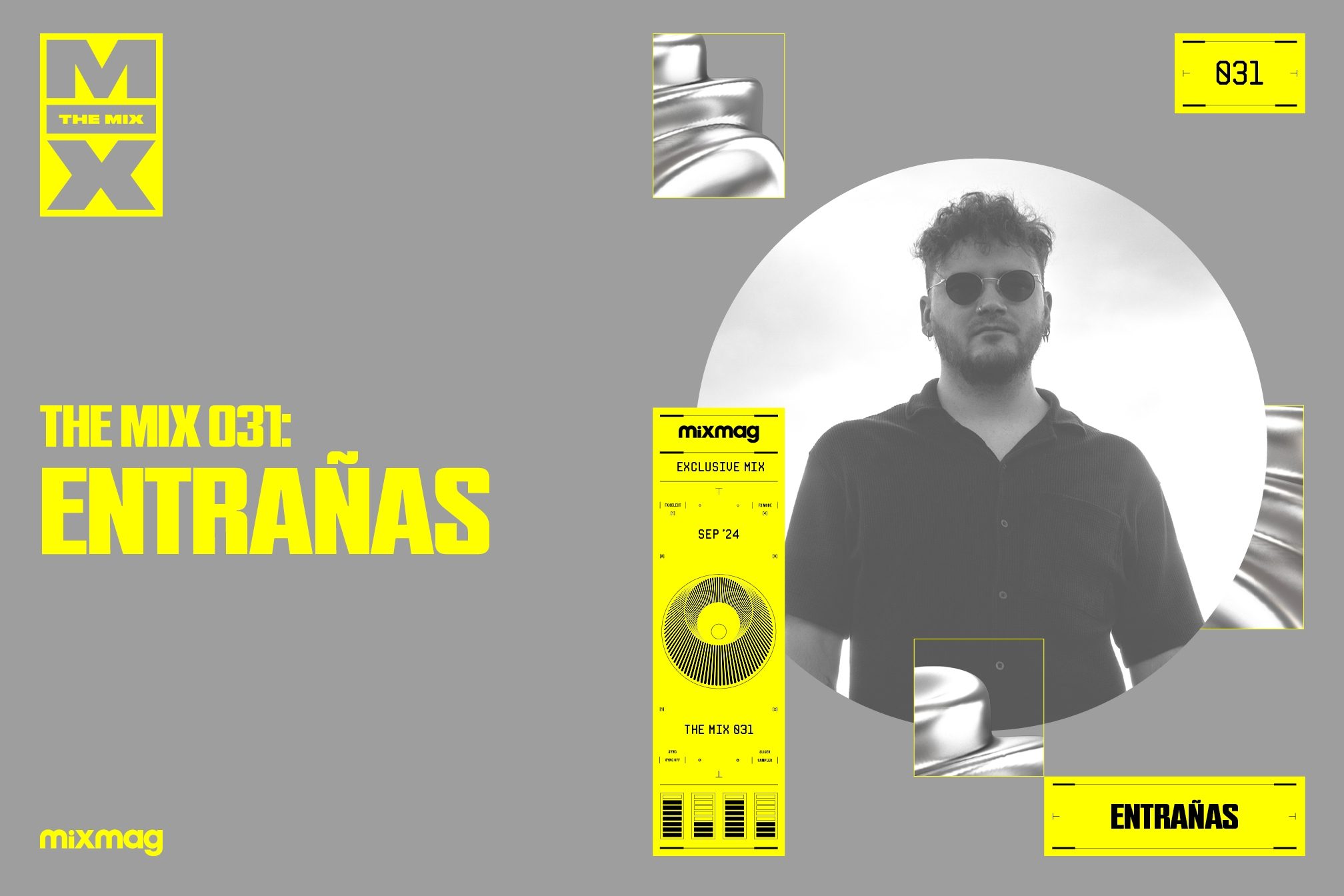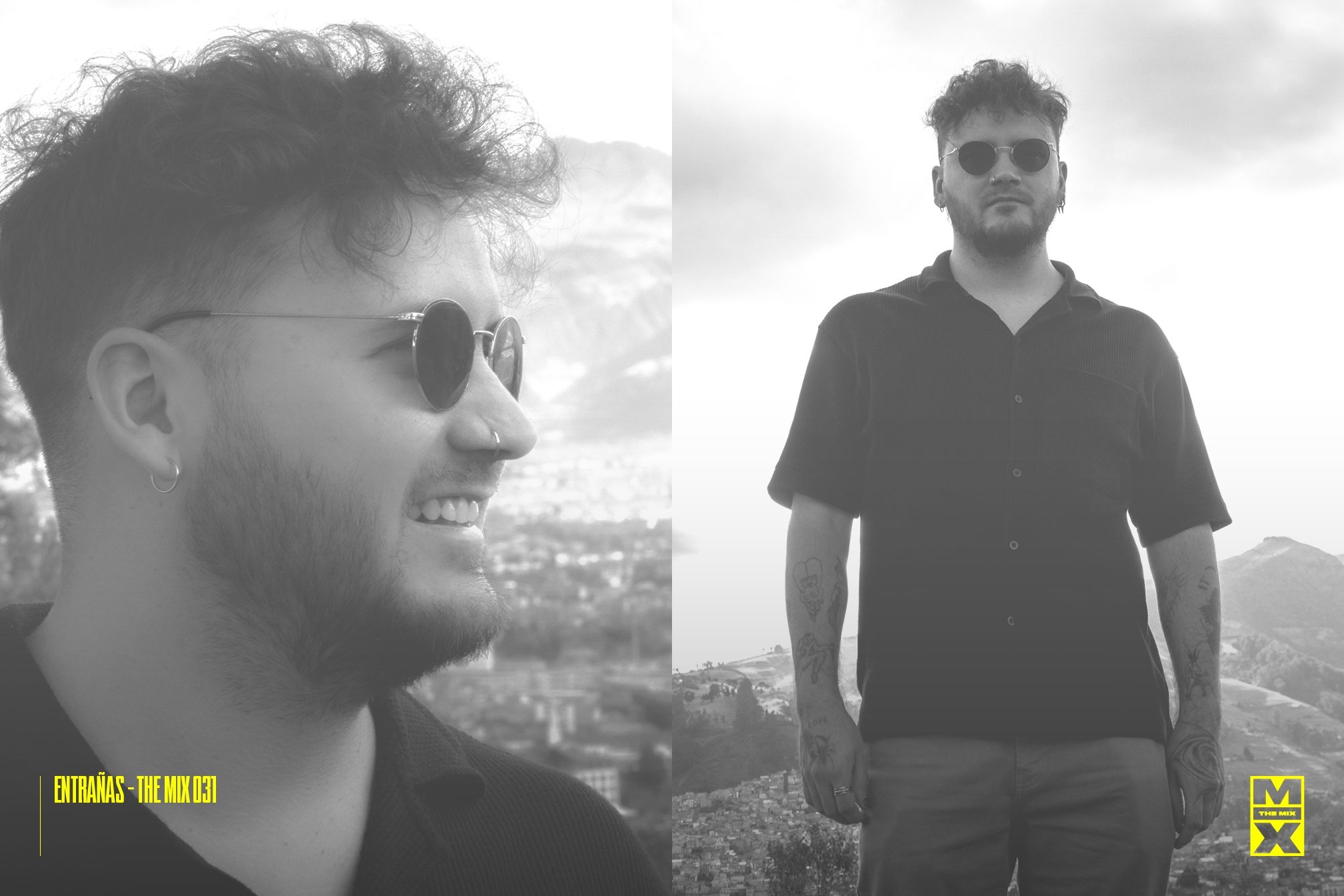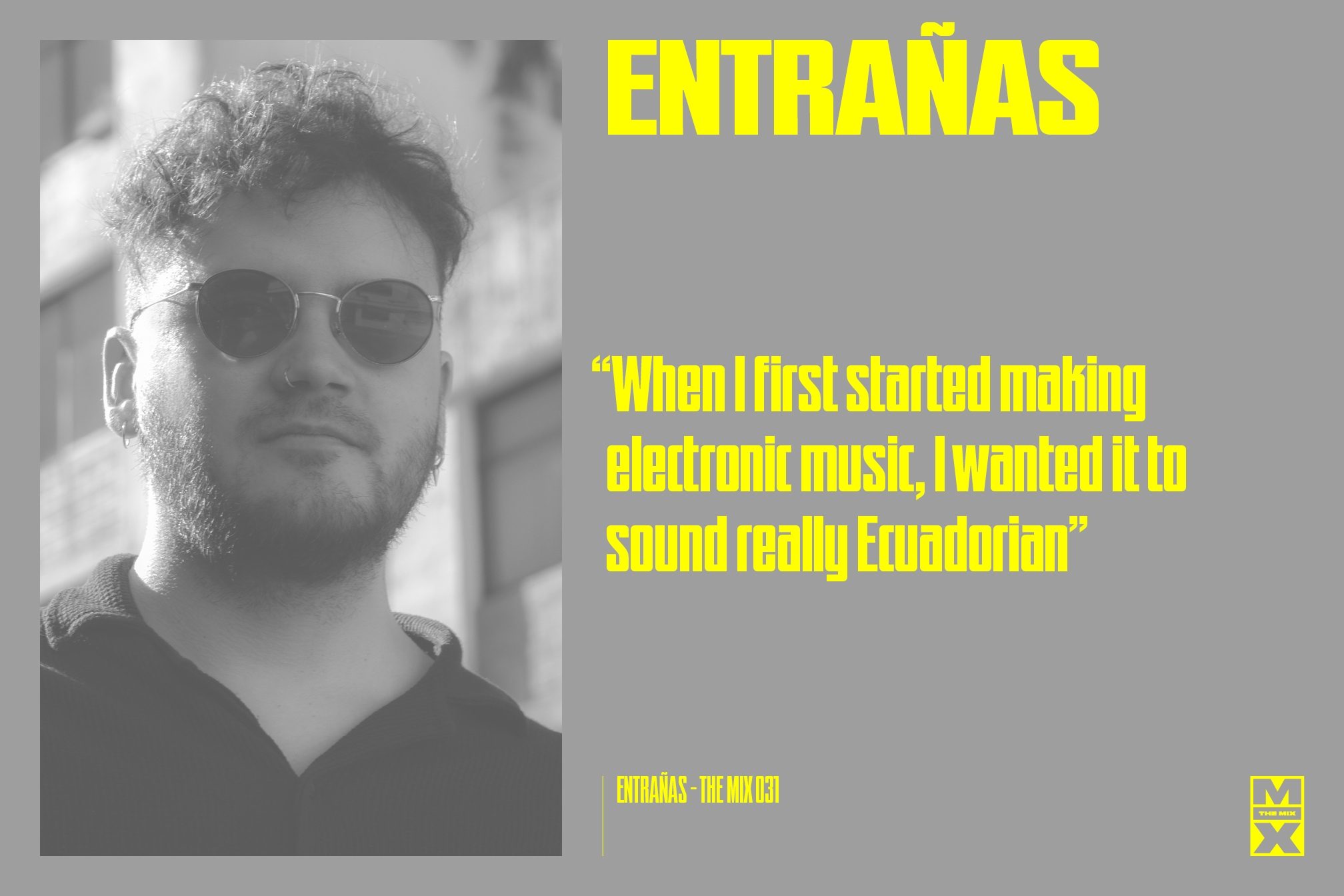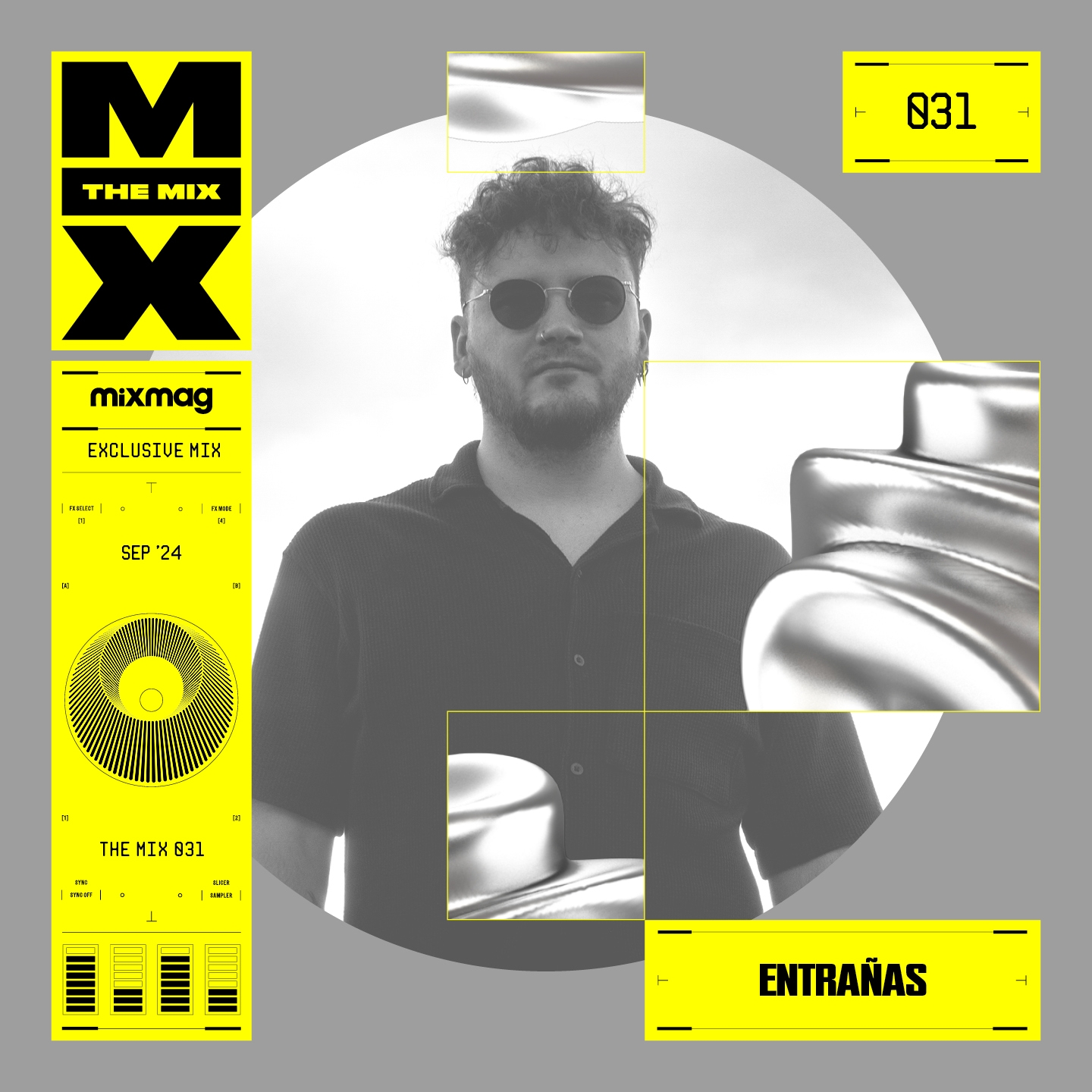 Music
Music
The Mix 031: Entrañas
The Quito-based producer concocts a genre-busting mix of club music from Latin America and speaks to Felipe Maia about Ecuadorian music and his debut album 'Caverna'
Entrañas creates music from within. Not only does Ecuadorian producer Daniel Gachet's stage name come from a lexicon of innards — "entrañas" translates literally to "entrails" — but the title of his first album means "cave." His music, though, is more of a way out than a way in. ‘Caverna’, his debut release with Infinite Machine, showcases an artist eager to introduce his own universe to the world: a constellation of traditional Ecuadorian music transformed into polyrhythmic dancefloor hoodoos, gritty textures of ambient and metal, and intense yet danceable motifs and London-through-Quito wobbly baselines. It's a sonic palette that has earned him a place among the wave of Latin American artists reshaping the global club music soundscape.
“When I first started making electronic music, I wanted it to sound really Ecuadorian,” says Entrañas over a Zoom call from Quito. Born and raised in Ecuador's capital, the producer stepped into music as a guitarist during his metalhead teenage years. Once as an audio engineering student, he jumped to Ableton Live and started experimenting with beats and samples for hip hop. The third and final shaping act, however, was more about listening than making music. “When I discovered NAAFI and listened to records by artists like Siete Catorce, Lechuga, and Lao, it blew my mind,” he says. The headbanging intensity, the beat-making creativity, and the fusion of Latin club music—all of these converge in Entrañas’ music.
Read this next: How Ecuador's relative isolation is cultivating a unique electronic scene
His place and roots, Quito, also play an essential role in his music-making. The hilly, landlocked city serves as more than just an aesthetic inspiration. "Wherever you stand, it looks like a postcard photo," says the producer. The noises and soundbites from the capital and its surroundings also find their way into Entrañas' sonic toolkit, initially in ambient music and now in club-oriented tracks. More than that, it's the constant paradox of beauty and harshness, blue skies and grey streets, that weaves in his work. And this red thread goes beyond sound. "At the beginning of the year, there was a terrible level of frustration and uncertainty here, there were power outages, we had a curfew for the first three months, it was tough," he says.
Lingering in a horizon of doubt (a trait that brings together Latin American artists) of all sorts, Entrañas casts off ‘Caverna’ as a grim and unsettling atmosphere. It's a sense of urgency embodied by tracks like 'Nauseas', with its thumping kicks and ear-tingling clicks. Intricate drumworks set a dark and yet energetic mood, as in the blaring tempo-shifts of 'Diclofenaco' or the off-kilter bomba drums of 'Ajicito' — that also features some elating strings by the former metal guitarist. "'Ajicito' is a sauce. It’s not that spicy, it’s kind of soft, and that’s the most organic track on the album with the guitars I recorded," says Entrañas. "''Diclofenaco' is a medicine that I’m allergic to, like if I have some of that, I could die."
Beaming out of Entrañas' cave is a passion for Ecuador's music that is little known even in South America, a knack for baile funk acapellas, and a taste for the intensity of the UK bass tradition. This puzzle, especially evident in his special one-hour mix of unpredictable, alarming dancefloor joints, also highlights the uniqueness of his work. Swallowing a world of noises and regurgitating it as his own Ecuadorian electronic music, Entrañas is among a new wave of producers who refuse to let Latin club music become a fad. It’s a new world from within.

What first got you into music? Your latest album, ‘Caverna’, has textures and sounds as diverse as ambient and Ecuadorian traditional music.
I started making electronic music because I was a huge fan of NAAFI’s records, producers like Siete Catorce, Lechuga Zafiro, and I when I started listening to them I thought, "Wow, electronic music is amazing and can sound really local." This was I’d say about eight years ago. But first I started making rap beats, which I loved. I couldn’t just make an album, so I went with rap. Chopping up beats, sampling, this kind of stuff. I did that until I learned how to develop my own sound, something that I wanted to sound very Ecuadorian. When I was in school, I used to go to a lot of metal band concerts in Quito, bands that I loved, and that’s when I started playing guitar like crazy, like really intensely. I loved it. When I went to university, I studied sound engineering and music production, and I always wanted something heavier. But the only bad thing about metalheads is that they’re a bit narrow-minded. And some friends gave me a cracked version of Ableton Live and said, "This program is going to change your life"
This sort of narrow-mindness to some metalheads is a phenomenon quite common in Latin America, especially as these fans grow older. But that also happens in electronic music. You mentioned that you didn’t know electronic music could sound local. Why?
In Quito, electronic music is super elitist, and the music that plays the most in clubs is techno and tech-house, a kind of music that just has never spoken to me. I’m not saying it’s bad, but it just doesn't connect with me. It sounds very repetitive and very foreign to me. Then, I learned about NAAFI and listened to those records by artists like Siete Catorce, Lechuga and Lao, all that stuff, it blew my mind. And the cool thing is that recently, when Lechuga came to Quito, I got to open for him, and it was amazing. I told him, "Look, this is the best, you changed my mind, you changed my life," and it was great. I gave him a copy of ‘Caverna’, and he really liked it.
Read this next: NAAFI: Bass without borders
So what makes this an Ecuadorian album of electronic music? What is its element that makes it stand out, not just as Latin American, but as Ecuadorian?
‘Caverna’ has a lot of rhythmic bases that I draw from local genres, like the albazo, and lots of sounds from drums used in those rhythms, like Bomba del Chota, which is music from northern Ecuador. I sampled the rhythmic pattern of these genres and started manipulating. There are many polyrhythms in Ecuadorian music, the drums I used, and I also like to think that the melodies I make sound melancholic. And it’s like Quito is a super grey city, full of mountains, we can’t even see the horizon, there are only mountains all around, I love it, it’s very beautiful. And I feel like it reflects a bit what it feels like to be here.
You mean the city has influenced your way of making music in this album?
Yes, a lot, at least in the positive aspects. The food here is incredible, I have a lot of tracks named after food dishes. My friends, and people I know here, all of them are incredible people. There are negative aspects: there aren’t many opportunities, at least if you make this kind of electronic music I make, and there aren’t many events for this kind of music. But with several friends and collectives, we managed to organise our own parties and events. Let’s say, the food, the people, my close friends, mainly my family, and the landscape of Quito is amazing. In five hours, I can be at the beach if I want, and if I walk for half an hour, I’m on a mountain. It’s great; wherever you stand, it looks like a postcard photo. It’s very beautiful.
How did you get so interested in Ecuadorian music? Is it from your childhood?
My grandpa loved Ecuadorian music and I’ve inherited a lot of vinyl records from him. And later on, when I went to university, I met all kinds of people. There's this friend of mine, Jesús Bonilla, who has a famous indigenous music group called Uma Zapa. We used to have conversations, and he would just teach me about Ecuadorian music, and recommend books to me. Thanks to him, I got this drive to learn more about Ecuadorian music. Ecuador lacks memory, archive, so it’s a bit hard to access traditional stuff. There’s a great DJ with a YouTube channel called Musicoteca, and I think he uploads records he has. But unfortunately, we don't have lots of initiatives like that. On the other hand this is something that brings some magic to music research, that moment when you find a gem.

There are a couple of Ecuadorian producers who are known abroad. Nicola Cruz, for instance, is a name that always comes up. Do you think there’s an Ecuadorian movement in electronic music?
Nicola had a very specific movement with his party, and I had the privilege of playing there, La Sagraria. He hasn’t done other editions for a while now, and I imagine it’s because of the difficulties in finding a venue and all that. But just seeing how he played his cards, I also want to play my cards, and I want to do that with a lot of friends I collaborate with. People like Cruzloma, Zunfo, No Time For Love, Kaifo, Joaquín Cornejo. There’s a whole movement of people making electronic music that’s not the usual electronic music, let's say. It has Latin roots, you can see it right away when you listen to that music. And many of these friends and DJs, it’s not that they play as much as I’d like. I’d like us to be in the top clubs in Ecuador, playing all the time.
Do you see yourself as someone who can or wants to develop the scene in Ecuador or do you think now is the time to take advantage of the global interest in Latin Club and Latin electronic music, and get out there and bring Ecuador with you?
I’ve done a lot of parties with friends and different collectives, but they’re super underground, in places with not-so-great sound. I’d like to travel the world and bring back everything I learn out there. In many clubs here, they always tell me, "Don’t go too experimental," or "You have to play more reggaeton." But I want to throw a party where my friends and I are playing bass, electronic music with Latin roots, and then at the end, we'll have people playing chicha and rural music on vinyl, with everyone dancing hard. That would be my ideal party. But yes, my dream is to travel and take advantage of the world’s focus on Latin America to share my music. Unfortunately, Ecuadorians have a really bad passport. For example, we need a visa for almost everywhere. I managed to get a US visa, so I can go to Mexico and the States, and now I’m applying for a Canadian visa. Most importantly, I want a visa to visit Europe. I’ve had so many invitations to play there, but I always have to say I don’t have a visa, and it’s tough.
Do you believe the social and economical crisis faced by Ecuador over the past few years have also echoed in this movement and your music?
Yes, at least lately in this album, because there’s a crisis in the country, and it’s like you’re frustrated because you can’t convince the mainstream audience here that you’re making electronic music because they don’t even consider you an electronic musician unless you’re doing techno. And secondly, nowadays, after all these political conflicts, it has become super unsafe. I can’t even, as I said, go out and enjoy the landscape or walk at night because I could get robbed or kidnapped. And at the beginning of the year, there was a terrible level of frustration, uncertainty, there were power outages, we had a curfew for the first three months, there were no events, and that affected everything because I also work as a sound engineer for events, and there were no events for the first three months of the year. I was like, "How am I going to live?" It was tough. But now we're recovering from it. There was an event last weekend at the town hall where we played on top of an observatory with video mapping, it was crazy, and it was free. I feel like I see the light.
Read this next: How The Cost Of Living Crisis Is Impacting DJs And Producers
One thing about Latin American electronic music is that it's not necessarily new. In fact, you've been influenced by NAAFI, a label that's been around for a few years now. Your work entails a dialogue with NAAFI, TraTraTrax, but what's new about the wave you represent in Latin American electronic music?
I feel like we have it easier today thanks to globalisation and the internet. In the end, I started uploading my tracks to SoundCloud out of nowhere, with a bunch of people I don't even know listening to it, without having to go through social barriers like releasing an album, or anything like that. It was just SoundCloud doing its magic, and that’s it. The internet is amazing, and that’s what I feel makes it a bit easier for us. We should also always be grateful and remember the history, like the NAAFI records or the raptor house stuff that’s much older—all those things have been paving the way for all of us. I don’t see myself as a flag-bearer of anything, I just say, I make music that I’m passionate about, and I want it to reach more people, and if more people like it, I’ll keep making it. And if it’s clear that it’s made in Ecuador and has roots from here, I’ll be very happy.
Can you tell us about your mix?
Inside this mix you will find new music by me and amazing music made by many great friends, from different parts of Latin America, from whom I always learn a lot and they inspire me to always be better. I consider that this music has a lot of personality and showcases that being Latinx is not a music trend or just consists of the same rhythm and musicality found in reggaeton or guaracha, but a diversity of rhythms and musicalities.
Entrañas debut album 'Caverna' is out via Infinite Machine on September 27, get it here
Felipe Maia is a freelance writer, follow him on Twitter

Tracklist:
Divina Niña - Apocalipsis
Entrañas - Choro
Brenda - Te Hace Falta La Eñe
Entrañas - Yapa
WOST x Entrañas - ????
Ene Ese - Is This LatinClub?
Entrañas - Culebreo
Entrañas - Balón Ponchad0
Parzubanil - Contról Rítmico
Entrañas - Raptorsito
Entrañas x Lukrø - Mulheres
Entrañas x Ene Ese - Bollo
Sepbtt - Unreleased02
RedKenPanda - NENA
Entrañas - Nauseas
Zunfo - Chota2035
Orieta Chrem & Selvagia - Eso Seria Todo
Dj Latinchat - Mistico Divino
Vudufa - Qdoom (Entrañas Remix)
Jaijiu - Hwwwambo Dj N Fox goes Brazil
Entrañas - Sequito
Zunfo - Carnaval en 6/8
Orieta Chrem & Selvagia - Carapulcra
Ene Ese - Bhuaguasha
Entrañas x Selvagia - Inibiguini
Ricardo Suntaxi - El Cigarrito (Dj Tazzmania Mix)


